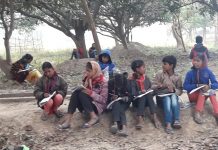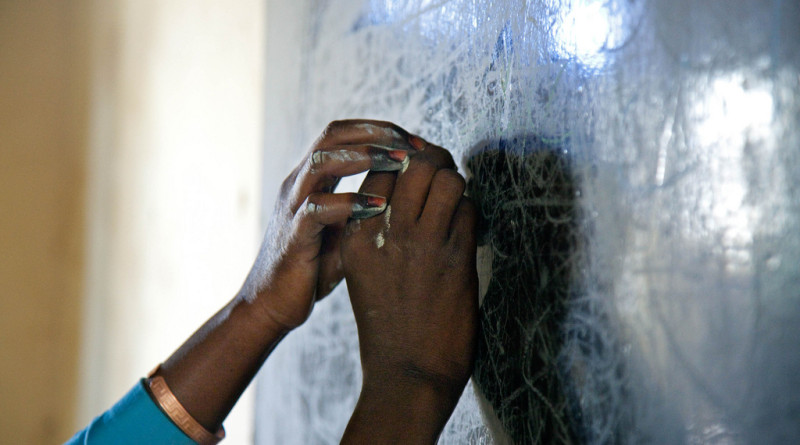
Belonging to the field of education, I do ponder upon my role as an educator in this changing time. We tend to emphasise upon conceptual learning and bookish knowledge but the question really is, is this education preparing our students to face the real world or equipping them to handle conflicting situations? Are we equipping them to handle the problems real to them? Have I guided them enough? Do they have the necessary skill requisite for them to problem-solve effectively and efficiently? Thus, it is imperative to guide and scaffold the learners to problem-solve and arrive at rational decisions which are not merely based on selfish interests.
On thinking deeply, I do not seem to be satisfied with the efforts done so far. On reflection and introspection it came on surface to me that in the process of teaching children we have made them comply so much that they have stopped ‘thinking’. They (learners) do not think that these matters will really impact them. As the education system has not been relevant for the students. Due to lack of relevance and connection to the real life, children lose interest in the process of learning.
The world has survived because of the human tendency to solve problems and adapt. Furthermore, it has depended on the ability of people to co-create and to adapt better to the changing times. All the inventions and discoveries have happened because there was a thought to it. The industrial revolution was the by-product of the need and demand of the changing time. Similarly, we are entering the fourth industrial revolution, wherein the artificial intelligence will take precedence in tasks which require drill, repetition. However, the creative and imaginative skills will still be in control of humans, as only they have the necessary skills to do so.
The skill of creativity and imagination bloom best when they are planted in the environment of conversation and dialogue. Only through collaborative thinking will we get divergent thinking leading to innovation. In order to engage in collaborative thinking, it is important to have mindful listening and sharing of ideas. This leads me to reflect on whether learners are prepared to listen and to reflect upon eachother’s ideas and to learn from them? Are they ready to listen mindfully? With these thoughts dominating my mind, I thought of sharing a couple of ideas on effective listening and its significance for informed education.
LISTENING AS AN IMPORTANT SKILL
When listening, one is hearing what others are saying and trying to understand what it means. The act of listening involves complex affective, cognitive and behavioural processes.The process of understanding the sounds or words or sentences is called listening comprehension, to understand what one listens. As an educational pedagogy we emphasis a lot on listening of instructions however little is done to ensure effective listening comprehension in classes. Due to this skill deficit, even as adults we fall short of listening to each other and responding appropriately. Instead the conversations end up being arguments. Frequent practices and rehearsals of the different kinds of listening results in mastery of the concepts and generalisation in day-to-day conversations.
PURPOSE OF LISTENING
While discussing about listening as a skill, it is essential to discuss on the purpose of listening. Any listening taken up as an activity has a purpose. One listens to a song because one likes it, another listens to a phone call to convey an important message. We listen to communicate effectively. Thus, effective listening determines the quality conversations one holds with the others. The flow chart below depicts the purpose of listening in simpler terms.
Also, the audience and the setting are other factors which are important to be considered by the purpose of a listening activity. The purpose for whom the listening is aimed at determines the kind of content give. Also, the setting determines the time one can devote to listen. Thus, an individual’s attention to any listening activity (in daily life or academic driven) will be dependent on these factors. For example: A train announcement is very important to be listened for important information, one may not listen it completely for understanding. Similarly, a movie song may be heard for fun or pleasure but may not be heard for specific details. Thus, it is essential to plan a listening module in order to train the learner. The purpose of listening determines one’s way of handling the auditory inputs.
KINDS OF LISTENING
Whenever we listen to any audio (be it recording or in person), we subconsciously swift that listening with the purpose. The purpose results in two kinds of listening. First, it is to listen for gist understanding. Second, it is to listen for specific details. Likewise it is for reading. While listening to a song, one may or may not pay attention to any new vocabulary used in that song, though all will surely listen to understand the meaning of that song ‘What is the song all about?’ Whereas, while listening to an audio to count how many times did the word ‘sorry’ came, I might not go for understanding the song or grasp its feel. Thus, an educator needs to be clear with the kind of listening they need to pay attention to. Ideally, while training children the educator must begin with the audio wherein the listener understands the gist. He/she needs to connect with the audio at affective domain along with the cognitive domain. After the child has grasped the gist, should one move to identifying the specific details on ‘what/where/when/who etc’. The mistake is committed when we try to move to identify the specific information before understanding the gist. Or we listen and understand the gist but do not move to paying attention on specific details. A miss in either of the two impacts the complete understanding of the audio. Due to which, one might misinterpret the information presented.
TRAIN THE CHILD TO LISTEN
Thus, we understand that we cannot live with an assumption that a child is listening to the speaker and understands whatever is being communicated. On the contrary, an individual might be engrossed in his/her own thoughts and may not listen to what is being said, leave apart understanding it and responding thoughtfully. Or he/she might not have the necessary language/ vocabulary repertoire to understand the meaning. Therefore, it is important to train a mind to listen mindfully. Mindful listening comes with a lot of training which should begin in the early years. When trained regularly and consistently, the ears and mind get used to listen to understand and derive data. Along with that it is important to provide language exposure to children right from the young age to build on their language comprehension.
Children who struggle with language comprehension also struggle with listening comprehension due to limited language exposure. This understanding has emerged from the assessments conducted in my organisation for children from poor socio-economic backgrounds. The environment did not provide language exposure in English language (it being the second language). Thus, poor language comprehension has always been a hindering factor in their academic progress. Furthermore, poor language comprehension affects their learning in listening skills.
Therefore, it is imperative for an educator to work multi-fold with a child. On one hand, we need to work to enhance exposure for language comprehension. Whereas on the other hand listening skill needs to be developed in isolation. A child will show progress only when the inputs are pouring in from all the sides. Language comprehension will develop when you immerse the child in the language you want to develop. Chomsky argued that children will never acquire the tools needed for processing an infinite number of sentences if the language acquisition mechanism was dependent on language input alone. Consequently, he proposed the theory of Universal Grammar: an idea of innate, biological grammatical categories, such as a noun category and a verb category that facilitate the entire language development in children and overall language processing in adults (Source: https://www.simplypsychology.org/language.html)
In specific to develop listening comprehension; an educator must follow the following steps. Please note that the setting mentioned here is a formal setting and does not include the informal setting(s).
Step 1:
The educator should select the audio which suits the listener’s level of cognition, complexity and comfort with the language. For example: children from socio-economic background struggle to comprehend the international accent, specially 6-7 years old. Therefore, the background, age of the child should be considered.
Step 2:
After selection of the audio, the educator should prepare a set of questions (regarding specific questions) which he/she would want the child to answer. This will be used later, however the mind map of the educator should happen before initiating the skill development.
Step 3:
Now, the educator will play the audio for the first time for the target audience. Let them listen without activating any schema or prior knowledge. This is to build upon the gist understanding of the audio. After they have heard the audio, ask the following questions:
What was the audio about? If the child struggles for the vocabulary (due to background or any disability), you may provide options, for e.g. was it about a house or a school? This will ease their worry for search for the words and speak at the same time.
Elicit, appreciate and welcome all the responses. You may want to discuss a response which may be completely out of the box. However, this discussion should not be for more than 1-2 minutes ( you read me right!). Too much time on an activity brings boredom.
Step 4:
Next step is to orient them to listen for specific details. Now, provide children with the set of questions you may want them to answer. Let them go through the questions before you play the audio for the second time. After they may have read the questions, play the audio for them to answer questions. They may want to write the responses while listening to the audio. Please remember, you are not testing their memory however, training them to listen for details.
Step 5:
Children/audience might want to listen to the audio to either verify their responses or to complete answering all the questions. The educator should play the audio as per the need to the learners. The environment should not be that of testing but of learning.
Step 6:
The educator may include interpretative questions, wherein he/she would want the learners to connect the audio to their real life experiences or form opinions for the same. Thus, interpretative and opinion-based questions are very important to level raise the child in listening comprehension. The educator could also have varied activities like drawing an interesting image for the audio or what did you feel after listening to the audio.
To sum up, the purpose of listening is for effective communication and learning opportunities. It is also a skill needed in the 21st Century for engagement in dialoguing. Dialoguing is the seed for problem-solving and collaborative work. It is important to understand that listening skill is imperative in formulating young receptive minds. These young minds should be open to discussions and not snub them as an argument. When listening skills will be in place, the learning channels will be open to further learning. While teaching the skill of listening it is important to determine the purpose of listening. Based on the purpose of listening the kind of listening activities and audio will be selected to teach the child. Parents, educators should aim to develop effective listening skills in the children in order to make them receptive and interactive individuals.
In today’s time with global powers trying hard to make an impact in the global politics leading to anguish between countries in order to win the supremacy race. To a civilian ( like me ) it seems that I(part of the country I represent) might have (not willingly) to plunge in war in the near future wherein the global powers (in alliance) take one other head on in order to demonstrate their dominance over the other. As the news for constant rift between America and China surface. It is further intensified and emboldened with increase in regional tensions between Islamabad and New Delhi and on Korean Peninsula. The new world needs to develop empathy and selfless work for others. By listening to others we will be better placed to relate with others and connect better. The world will be a happier place. It will be a place wherein diverse perspectives simultaneously exist.
Upasana kapur is currently working as a primary teacher in an esteemed organization in Delhi from past 11 years. ![]()










